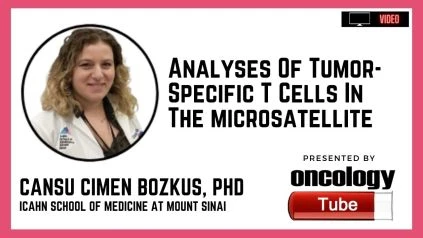Cansu Cimen Bozkus, PhD, Assistant Professor at Icahn School of Medicine at Mount Sinai. In this video, she speaks about the AACR 2022 abstract – 253 / 19 – Analyses of tumor-specific T cell dynamics and tumor immune contexture in microsatellite instability-high cancers in response to first-line therapy.
Overview:
The MSI-H phenotype is caused by faulty DNA repair processes and is present in many cancers, including colorectal and endometrial cancers. MSI-H malignancies can be used to research the aspects of neoantigen-induced anti-tumor immunity in response to therapy and disease outcome due to large neoantigen loads produced from tumor-specific mutations, evidence of tumor-infiltrating T cells, and high response rates to checkpoint inhibition (30-60%). We previously discovered a group of recurrent frameshift (fs) mutations in MSI-H tumors that resulted in immunogenic polyepitope neoantigens (neoAgs) that elicited CD8+ T cell responses. The purpose of this study is to see if these common fs-neoAgs elicited spontaneous T cell responses in MSI-H colorectal and endometrial cancer patients. We used ex vivo IFN- ELISPOT to assess the frequency of fs-neoAg-specific T cells after fs-peptide stimulation in peripheral blood mononuclear cells (PBMCs). In addition, using MSI-H patient PBMCs, we separated naive and memory T cells and expanded fs-neoAg-specific T cells within each subset. Flow cytometry was used to detect fs-neoAg-induced effector cytokine (IFN-, TNF-) production, which was exclusively found in the memory subset, supporting the idea that shared fs-neoAgs prime CD8+ T cells in vivo to form clonally-expanded memory T cells in MSI-H patients. We found fs-neoAg-specific T cell receptors to further investigate the clonal growth of fs-neoAg-specific T cells in MSI-H cancer patients (TCRs). T cell lines enriched for fs-neoAg-specific T cells were produced from patient PBMCs and the variable chains of TCRs were sequenced. These fs-neoAg-specific TCRs were found in blood and tumor tissues from both main and recurrent locations. Finally, we used CODEX technology to perform multiplexed immunohistochemistry to identify the spatial interactions between the infiltrating immune cells and the malignant cells at single cell resolution. A panel of 35 markers was used to assess myeloid (HLA-DR, CD11c, CD14, CD68, CD206) and T (CD4, CD8, Foxp3) cell subsets, T cell activation (CD107a, CD69, Ki67) and exhaustion (PD-1, TIM3, LAG3), T cell states (TCF-1, TOX, PD-1) and the presence of tertiary lymphoid structures/antigen presenting cell niches We also looked into potential immune escape mechanisms in MSI-H malignancies, such as B2M and MHC-I deletion. This research will shed light on the quality and amount of shared anti-tumor T cells in the peripheral and tumor tissues, as well as the immunological correlates of response or resistance to therapy in MSI-H cancer patients.

